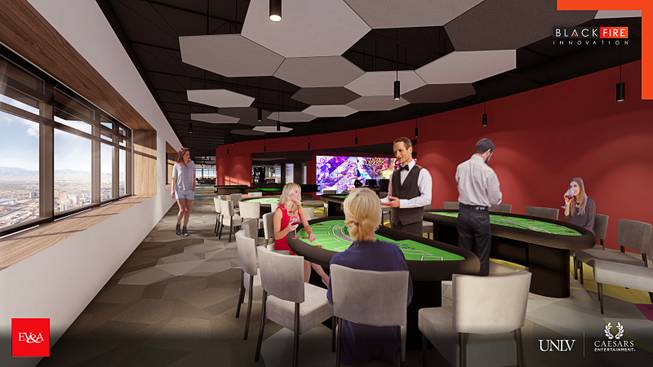
Courtesy
A rendering shows a casino floor lab at the Black Fire Innovation hub, currently under construction, at UNLV’s Harry Reid Research & Technology Park.
Sunday, April 28, 2019 | 8 p.m.
Caesars Entertainment is teaming with UNLV to create a gaming and hospitality technology innovation space in southwest Las Vegas.
The 43,000-square-foot education hub will feature mock hotel rooms, a casino floor and a sportsbook, officials said in a statement. An official announcement is expected Monday.
Dubbed “Black Fire Innovation,” the academic incubator will be located within UNLV’s Harry Reid Research & Technology Park. It will also include an e-sports arena and virtual reality facilities, officials said.
The goal, according to the organizations, is to help propel the gaming industry forward in an educational setting with an emphasis on gaming technology. The space is expected to be open before the end of the year.
“This collaboration with Caesars Entertainment will strengthen UNLV’s role as a research leader and further elevate Las Veags as the global intellectual capital for gaming and hospitality,” UNLV president Marta Meana said in a statement. “Collaborations like Black Fire also give our students unparalleled access to experts at the forefront of the industry.”
Black Fire will be located in a four-story, 111,000-square-foot building on the footprint of the under-construction technology park, which is a collaboration between the university, the UNLV Research Foundation and Gardner Company, a real estate firm.
Caesars has a four-year lease for the space and two automatic four-year extensions, according to records from the April 12 Board of Regents meeting. Black Fire will occupy about a floor and a half in the building, which is expected to cost around $35 million.
“The fourth floor will house what will be more of a mock resort,” said Zach Miles, associate vice president for economic development at UNLV. “It will feature a casino and a couple of hotel rooms of the future and a café of the future. There will be robots wandering around the facility that we’ll be testing for how they engage with those different facilities.”
Caesars executive vice president and chief information officer Les Ottolenghi said the project is an important step for the company in its efforts to lead innovation in casino gaming and a “momentous” event for the integrated resort business.
“We intend to accelerate innovation in a way that is truly unprecedented within the gaming and hospitality space,” Ottolenghi said in a statement. “Working side-by-side and with emerging student talent, technology partners and the community through this hub, Black Fire Innovation is designed to spur the creativity and entrepreneurship that will shape the future of our industry.”
Research done at the facility is expected to include a number of emerging technologies, a list that is expected to include blockchain and artificial intelligence ideas.
“There are some different public/private partnerships and business accelerators and incubators that are out there, but I certainly think this will be the first of its kind,” Miles said. “The intent of the (technology) park is to be a location where industry partners and the university and the community can rub elbows and bring ideas together. We certainly envision more of these types of collaborations in the future.”
The project, Miles said, is also part of a larger push to help drive southern Nevada’s economy forward.
“This another piece to the puzzle that Nevada is looking at with regard to economic development and diversification,” Miles said.
Financial details of the partnership between Caesars and UNLV were not disclosed.
The technology park is a 122-acre mixed-use community at the 215 Beltway and Durango Drive. The park is currently home to a charter school and a pharmaceutical company.
A 2018 economic analysis by the UNLV Center for Business and Economic Research estimated the park will generate around 25,000 jobs and as much as $2.6 billion in direct and indirect economic impact in Las Vegas over 20 years.
